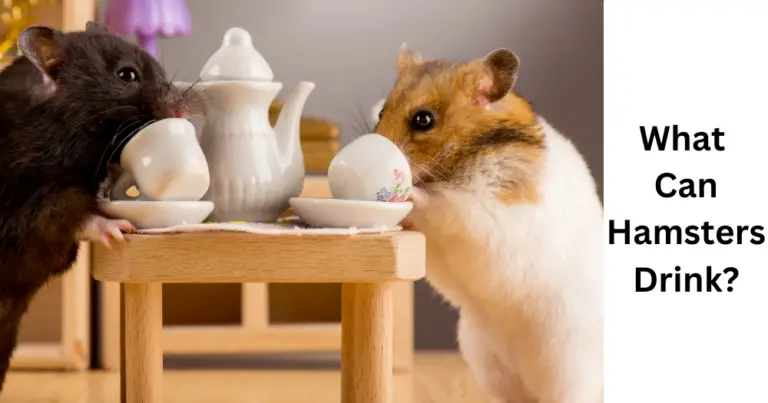Can Hamsters Eat Thyme?
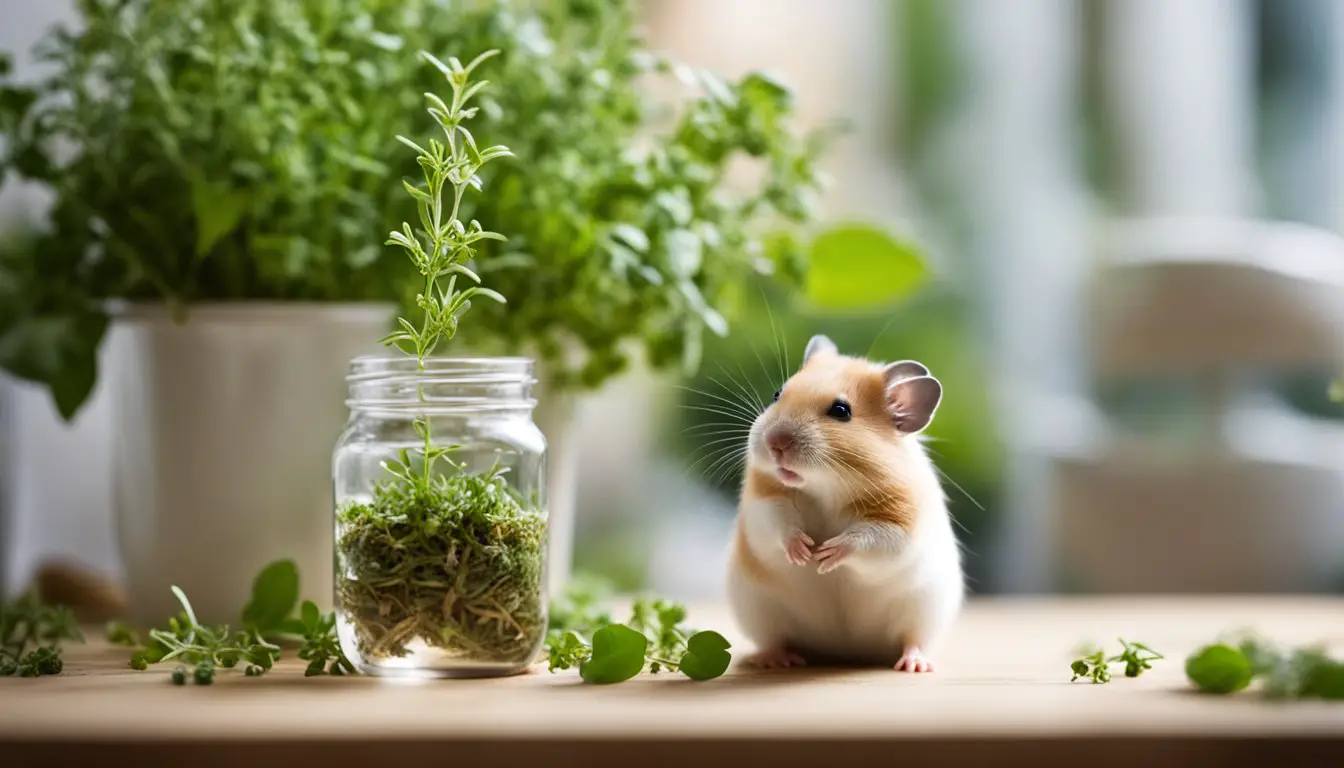
Are you a hamster owner wondering, “Can Hamsters Eat Thyme”? Worry not, as we are here to provide you with valuable information on this topic. Thyme, a popular herb widely used for its antibacterial and antioxidant properties, may seem like an interesting addition to your hamster’s diet. Let’s explore whether it’s safe for your little pet to consume.
Yes, hamsters can eat thyme. This herb is a good source of antioxidants and vitamins A and C, which can help boost their immune system and protect against diseases. Thyme also has anti-inflammatory properties that can help reduce swelling and pain in the joints.
Additionally, this herb can help improve digestion and relieve gas and bloating. However, it is essential to ensure that only fresh leaves of thyme are given and in moderation, as excessive consumption can lead to potential health issues such as diarrhea, abdominal pain, and kidney stones for hamsters.
Now that you know thyme can be a healthy addition to your hamster’s diet, it’s time to learn how to properly introduce it. Remember that moderation is key, and incorporating this herb into their meal plan can provide them with various benefits, all while keeping them happy and healthy.
Contents
Table of Contents
Overview of the Thyme
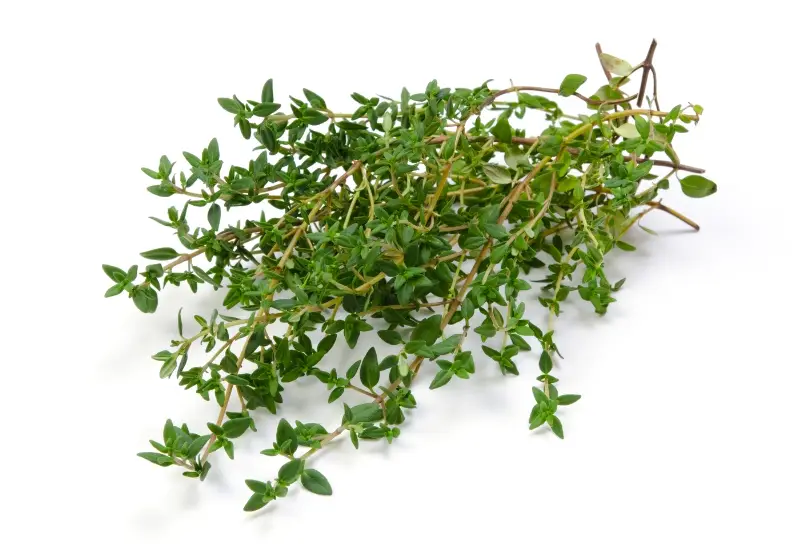
Thyme is an aromatic herb that is often used to season various dishes. It is a popular herb that is not only delicious but also has several health benefits. You may be wondering, can hamsters eat thyme? Well, the answer is yes! Your little furry pets can enjoy this herb safely.
Nutritional Content and Potential Benefits for Hamsters
Thyme is a good source of antioxidants as well as vitamins A and C. These properties can help boost your hamster’s immune system and protect against various diseases1. In addition to its antioxidant content, thyme also has anti-inflammatory properties that can help reduce swelling and pain in your hamster’s joints2.
Here’s a brief overview of the nutritional content of thyme for your hamster:
- Antioxidants
- Vitamin A
- Vitamin C
- Anti-inflammatory properties
When adding thyme to your hamster’s diet, it’s essential to do so in moderation. Gradually introduce small amounts of thyme mixed into their regular fruits and vegetables3. Too much thyme can be dangerous, so always be cautious with the amount you provide to your beloved pet.
Remember to maintain a balanced diet for your hamster, which includes not only thyme but also other vegetables, fruits, and a good source of calcium. By providing a nutritious and diverse diet, you can ensure your furry friend stays healthy and happy.
Can Hamsters Eat Thyme?
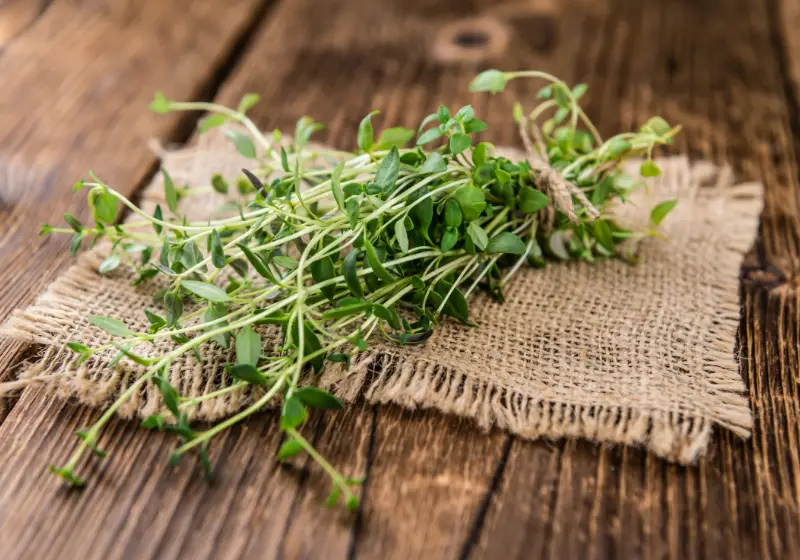
Yes, hamsters can eat thyme. This aromatic herb, which belongs to the mint family, is safe for your little furry friend to consume. Thyme is known for its antibacterial and antioxidant properties, making it a popular choice for seasoning foods 1. But let’s dive deeper into the safety aspect.
According to Cute Pet Care, thyme is a good source of antioxidants, as well as vitamins A and C. These nutrients play a vital role in maintaining your hamster’s overall health by supporting their immune system and protecting against diseases.
Discussing Potential Health Benefits or Risks
Beyond its safety, thyme also provides several health benefits for your hamster, including:
- Anti-inflammatory properties: Thyme can help reduce swelling and pain in your hamster’s joints, thanks to its natural anti-inflammatory compounds 2.
- Antioxidant support: The herb offers a wealth of antioxidants that help protect your hamster’s cells from damage caused by free radicals 3.
- Improved immune function: With vitamins A and C, thyme helps boost your hamster’s immune system, keeping them strong and healthy 4.
Thyme contains essential minerals, such as iron, calcium, and manganese, which contribute to your hamster’s overall well-being 5. However, just like with any other food, moderation is key to avoid potential risks or side effects.
Should This Food Be a Regular Part of the Diet or an Occasional Treat?
Considering the health benefits, thyme can be a great addition to your hamster’s diet. However, it’s best to offer this herb as an occasional treat rather than a regular staple. Your hamster’s primary diet should consist of high-quality, hamster-specific pellets, along with a balanced mix of fruits, vegetables, and other safe foods.
When introducing thyme to your hamster, start with a small amount to see how they react to it. If your hamster shows signs of discomfort, discontinue feeding thyme and consult your veterinarian for guidance.
Remember, variety is crucial to ensuring your hamster receives all the essential nutrients they need to stay healthy and happy. So have fun experimenting with different safe herbs and vegetables to give your furry friend the best nutrition possible.
Serving Suggestions
How to Properly Prepare and Serve the Food to a Hamster
To ensure your hamster enjoys a safe and healthy snack, it’s important to properly prepare and serve thyme. First, you’ll want to wash the herb thoroughly to remove any dirt or potential pesticides. Be gentle and use cold water, as thyme can be quite delicate.
Once clean, you can either serve it fresh or dried, depending on your hamster’s preference. Remember that hamsters enjoy variety, so it’s a good idea to occasionally switch between fresh and dried thyme to keep things interesting for them. Just make sure to cut the thyme into small pieces to prevent any choking hazards.
Recommended Portion Sizes
As with any treat or snack, moderation is key when serving thyme to your hamster. Feed them only a small amount, such as a pinch or small sprig, to avoid overloading their diet with too many herbs.
When introducing thyme for the first time, start with a tiny piece to monitor your hamster’s reaction and ensure there are no adverse effects. If all goes well, you can gradually increase the portion size in subsequent servings.
Frequency of Feeding This Particular Food
Because thyme is high in beneficial nutrients like vitamins A and C, as well as antioxidants, it is a suitable addition to your hamster’s diet. However, too much of a good thing can still be harmful. To maintain a balanced diet for your hamster, incorporate thyme as a treat, rotating with other safe herbs and vegetables.
Ideally, offer them thyme once or twice per week as part of their diet to keep them healthy and satisfied. This way, your hamster will appreciate this tasty addition to their meals without experiencing an upset stomach or other health issues due to an unbalanced diet.
Conclusion

Incorporating thyme into your hamster’s diet can offer some health benefits as long as you do so in moderation. Thyme is a good source of antioxidants and vitamins A and C, which can help boost their immune system and protect against diseases. Plus, the anti-inflammatory properties of thyme can help reduce swelling and pain in their joints. However, it’s important to remember that moderation is key when it comes to feeding thyme to your hamster.
To ensure your hamster has a balanced diet, consider offering them a variety of foods that promote proper digestion and overall health. Alongside thyme, a hamster’s diet should consist of:
- Hamster pellets, the main staple of their diet
- Fresh vegetables, like carrots and broccoli
- High-quality seeds or grains
- Occasional treats, like fruits and small insects
Remember, a diet with a variety of foods is essential for your hamster’s well-being. Too much of one type of food, even something as nutritious as thyme, can lead to digestive issues or nutritional imbalances. So, be sure to carefully monitor the amounts and types of food your hamster consumes to maintain their overall health.
Moreover, introducing new foods to your hamster should be done gradually to avoid potential digestion problems. This approach allows you to closely observe how your hamster reacts to new foods, such as thyme, and adjust their diet accordingly.
In conclusion, as long as you provide your hamster with a balanced diet consisting of an appropriate variety of foods and incorporate thyme in moderation, you’ll be doing your part to keep your furry friend happy and healthy.
Frequently Asked Questions
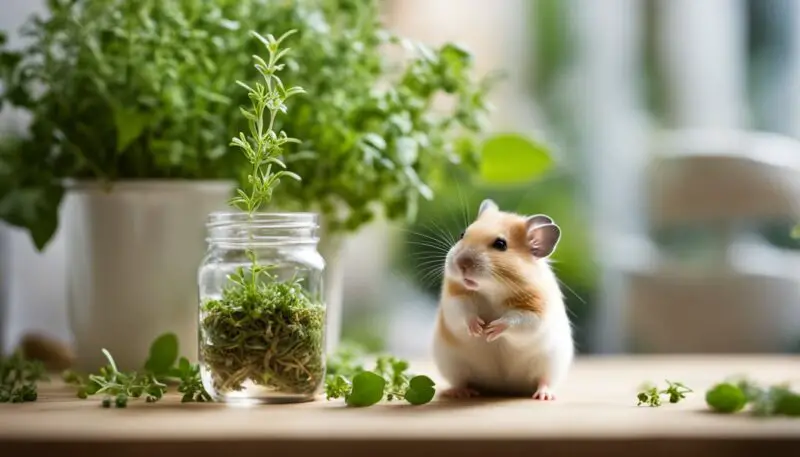
Can hamsters consume herbs safely?
Yes, hamsters can safely consume certain herbs in moderation. For example, thyme is a good source of antioxidants and vitamins A and C and can benefit your hamster’s health. However, it’s important to research each herb individually and consult a veterinarian before introducing new herbs to your hamster’s diet.
Is parsley okay for hamster diets?
Parsley is a safe and nutritious addition to your hamster’s diet. It is rich in vitamins and minerals, including Vitamin C, which is essential for your hamster’s well-being. Just remember to feed parsley in moderation and wash it thoroughly before serving.
What herbs are toxic for hamsters?
Some herbs can be harmful to your hamster’s health, and it’s crucial to avoid these toxic plants. For instance, onions, garlic, chives, and scallions are a few of the toxic herbs. Always research and consult with a veterinarian before introducing new herbs to your hamster’s diet.
How to use natural antibiotics for hamsters?
Natural antibiotics, like thyme, can be used to improve your hamster’s immune system and protect against diseases. To use them, simply include a small amount of the herb in your hamster’s diet or provide a thyme tea. However, always consult with a veterinarian before introducing any natural antibiotics to your hamster’s diet to ensure their safety.
Can hamsters eat rosemary?
Rosemary is safe for hamsters to consume in moderation. This herb has antioxidant and anti-inflammatory properties that can be beneficial to your pet’s health. However, it’s a good idea to consult with a veterinarian before introducing rosemary or any new herb into your hamster’s diet.
Which foods should hamsters avoid?
Certain foods can be harmful to hamsters and should be avoided. These include almonds, raw beans, avocado, chocolate, and any citrus fruits. It’s essential to always do proper research and consult with a veterinarian before introducing new foods to your hamster’s diet to ensure their safety.




